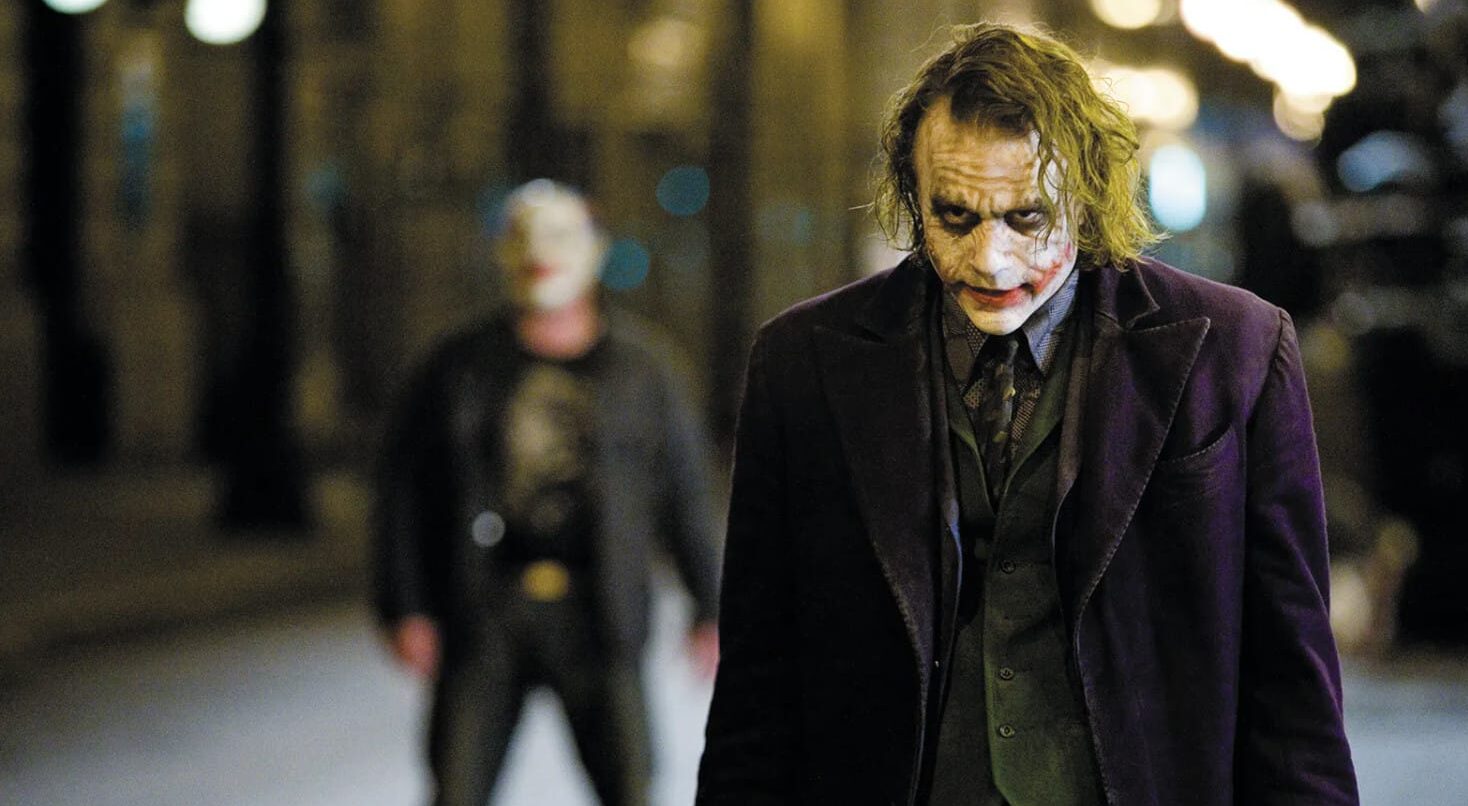As a devoted “Bat-fan” ever since I was first introduced to the Caped Crusader in childhood via the groundbreaking Batman: The Animated Series (1992-1995), I was excited to read a short magazine item announcing that a reboot of the Batman film series was in the works, helmed by acclaimed director Christopher Nolan.
Batman Begins (2005) exceeded all my expectations as a modern, grounded reimagining of Batman’s origin story and I eagerly awaited the sequel. When The Dark Knight (2008) finally premiered, it was not the kind of follow-up I had been expecting. Nevertheless, I certainly agreed with the near universal opinion of fans and critics that the film’s strongest asset was the late Heath Ledger’s spellbinding performance as the Joker.
I’ve watched The Dark Knight many times since, and on each subsequent viewing, I am amazed by the natural, apparently effortless way Ledger inhabits the Clown Prince of Crime. Over the decades there have been numerous on-screen portrayals of the Joker, but Ledger’s interpretation stands out from the pack as utterly convincing and thoroughly disturbing. By stripping Batman’s archenemy down to his bare essentials, Ledger gives the audience a glimpse into the Joker’s dark heart—exposing for the first time on film what truly makes him tick. Gone are any hints of playfulness or glamour from previous incarnations; what remains is an avatar of raw, ugly, unvarnished evil.
Morality is “a bad joke” and therefore “the only sensible way to live in this world is without rules.”
In The Dark Knight’s opening sequence, one of the Joker’s victims, perplexed by the apparent senselessness of the villain’s crimes, scoffs, “What do you believe in?!” Later, in answer to this crucial question, the Joker expounds on his twisted moral philosophy during a confrontation with Batman: “I’ll show you. When the chips are down, these civilized people, they’ll eat each other. I’m not a monster. I’m just ahead of the curve.”
Thus, we understand that the Joker has contemplated the problem of evil and has come to the following conclusion: Morality is “a bad joke,” and therefore “the only sensible way to live in this world is without rules.” This discourse is clearly influenced by Alan Moore’s iconic graphic novel Batman: The Killing Joke, in which the Joker insists that “everything anybody ever valued or struggled for . . . it’s all a monstrous, demented gag!” The Joker, when confronted by a seemingly indifferent universe, has decided that there is no transcendent dimension or ultimate meaning to human suffering. For him, the only appropriate response to this would seem to be nihilistic anarchy.

Which brings us to a fascinating question: Is redemption even possible for a person as gleefully, unapologetically evil as the Joker? Ledger’s Joker is an overtly diabolical figure. He is a scatterer, a destroyer who pits the citizens of Gotham against each another for his own amusement. He’s a tempter, who insidiously demoralizes the physically and emotionally scarred district attorney Harvey Dent. By convincing Dent to surrender his moral agency to the random chance of a coin flip, he transforms a decent man into the villainous Two-Face. The Joker is a pathological liar; he employs deception as a tool to manipulate and terrorize his victims. For example, he continuously weaves ever more ludicrous fantasies to explain the origins of his horrific facial scars, echoing another memorable line from The Killing Joke: “If I’m going to have a past, I prefer it to be multiple choice!”
Surely, such a fanatically evil person is beyond the reach of mercy or salvation? Perhaps not. Could it be possible that the Joker’s moral culpability is mitigated by reason of insanity? It would be easy to categorize the Joker as a sociopath whose demented ideations betray a tormented soul in the grip of mental illness. But such a stance seems unsatisfying. It also does not ring true with how Ledger’s Joker is portrayed.
The Joker’s guiding philosophy, while certainly depraved, seems too deliberately thought out to be solely the product of madness. The Joker is out to prove a point. His actions, while seeming erratic, are all carefully arranged to demonstrate his core beliefs: That life is meaningless and that the fragile veneer of civilization can be destroyed, as The Killing Joke puts it, by “one bad day.”
As presented in The Dark Knight, the Joker seems to be a human being whose worldview is so twisted, his will so conditioned by vice and brutality, that he has become utterly incapable of either giving or receiving love and mercy. A lifetime of casual violence and petty cruelty appears to have left him devoid of empathy and desensitized to grace. If confronted with divine mercy, would the Joker even be cognizant of the choice before him?
Alfred, Batman’s faithful father figure, observes that “some men just want to watch the world burn.” Perhaps because they burn with an unconscious desire for something they cannot explain away? At his final judgement, when he is face-to-face with the source of all truth, beauty, and goodness, when all the walls he has built up around his clearly wounded soul are broken down and all of his lies and pretensions to philosophy are burned away in the searing fire of the pure love he will finally encounter, how will a person like the Joker respond?
The answers to these speculations are probably unknowable on this side of eternity. As Christians, it is legitimate for us to hope that all human beings may be saved, that no one will make the final, irrevocable choice to reject the God who is love and whose divine justice is always informed by mercy. We are called by our baptism to cooperate with Christ’s saving mission to “seek and save the lost” (Luke 19:10) by praying for the repentance and salvation of even the worst sinners.

Gotham City is a haven of corruption, overshadowed by crime, sin, and disorder. The Joker believes the only obstacles to his plan to permanently submerge Gotham in a dark tide of despair are Batman and the police. But his scheme ultimately fails because of something that, in his pride and cynicism, he never expected: strengthened by grace from beyond the confines of this world, ordinary citizens can become heroes, confident that there is a light that “shines in the darkness, and the darkness has not overcome it” (John 1:5).
